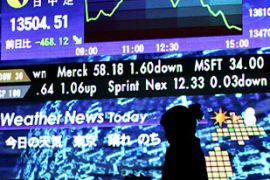Asian markets plunge on US woes
Nikkei ends at two-year closing low on disappointment over US revival plan.

Other Asian markets fell in tandem with Tokyo with Hong Kong‘s Hang Seng index nudging a loss of 4 per cent as the end of the trading day neared there.
Meanwhile in mainland China‘s financial capital the Shanghai Composite also took a hammering as the effects of the global credit crunch finally began to weigh on Chinese investors.
Among the main losers was Bank of China after a newspaper report on Monday warned that it was preparing to announce major losses related to the US sub-prime mortgage crisis.
The report in Hong Kong’s South China Morning Post quoted unidentified Chinese sources as saying the anticipated write-down for the fourth quarter of last year could send China‘s biggest bank into the red in 2007.
Investors unconvinced
Monday’s close in Tokyo puts the Nikkei down by almost 13 per cent since the start of the year.
Across the board, falling stocks massively outnumbered gainers, with the biggest losers in the real estate, financial and export-oriented sectors.
On Friday the Nikkei fell by more than 3 per cent in morning trade, before rallying as investors snapped up bargains and hopes were raised in anticipation of a stimulus to be plan unveiled in Washington by George Bush, the US president.
But the plan, unveiled after the Asian close on Friday, did not appear to convince investors.
“Some large investors appear to be dumping blue-chip stocks, and banks are down after financials in the US fell on Friday,” Masayoshi Okamoto, head of dealing at Jujiya Securities told Reuters.
“Part of the problem is that Japanese shares were bought up too high on Friday on expectations for the US stimulus plan, and then Wall Street reacted with disappointment, so investors are closing out their positions.”
Stimulus plans
In his speech on Friday Bush called for an economic stimulus plan worth up to $150 bn in tax cuts and other measures.
But the lack of surprises in the much-touted speech did little to convince investors of the health of the world’s largest economy.
In New York, the Dow ended last week down 0.5 per cent, with the broader S&P 500 also down 0.6 per cent.
Losses were also recorded on the European markets, with London‘s FTSE 100 falling 0.7 per cent.
The falling demand for shares comes on the back of the sub-prime mortgage crisis in the US, triggering billions of dollars in losses in big name banks such as Merrill Lynch, Citigroup and UBS.
Fears over a looming recession in the US were compounded last week by figures showing an unexpected decline in manufacturing activity, helping to drive stocks on Wall Street lower still.